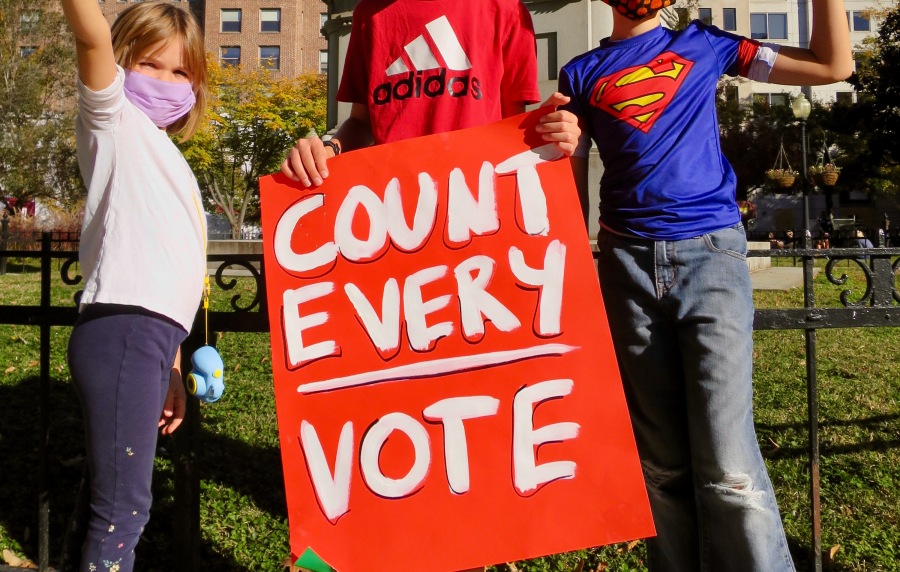Flopping into my bed, bits of dust fly up and tumble through the blade of light made by a slit in the curtains.
The man who rammed his car into the car behind me, and that car into mine, had the eyes of a child. Bewildered, wandering among the shards of chrome and plastic on Canal Road as if he didn’t understand what they were.
I wanted to go downtown and see the eerie scene before the Inauguration. I was prepared to be stopped by National Guardsmen, to thank them, to show them my ID.
He didn’t know how to find his registration in his glove compartment. He didn’t know which card was his license in his wallet.
Just as a police officer was arriving on the scene, my husband called. I knew he would say, “I told you not to go downtown,” and he did.
It took him 2 hours to get to work, he recounted, across the Chain Bridge through Virginia and into Maryland until he finally found a way back into D.C.
When a report was made and I was allowed to leave, the man was being loaded on a stretcher. He didn’t know what day it was.
The bed holds my back in my darkened room. My head feels metallic. Steel hitting steel still stored in my body. My car’s only memory the impression of license plate screws pressed into its bumper. Or is it?
Downstairs Virginia is playing Drake really loud — “You got it, girl, You got it” — as she gets ready for work at a juice bar where the streets are all blocked, Metro stops are closed, and where only 1 order will come in.
The officer on the scene called later from the hospital — he wanted to tell me that the man had had a stroke.
I wonder what he will remember of this day.
He said he didn’t have family to call. No friends. But when we helped him find his drivers license, I saw a photo of a small girl in pigtails that looked like him.
What will I remember of this day, this time? There will be notes in my journal, newspaper articles — about the plague, the election, the insurrection — that I stuffed among the quarantine mazes that my children made, so many mazes. But what will the soul record?

Every day begins the same, but little by little, the days change until you don’t remember how they used to be.
The day after the Inauguration, the kids go back to school and the hospital is open. My alarm rings at 6:00 a.m. I fumble to turn it off, then reach over my head to open the curtains. The sun wouldn’t let us sink back. The scent of my stirring husband next to me, heavy with sleep.
Sliding open the pocket door, I walk past the children sleeping in their rooms, my feet touching each heart pine tread as I go downstairs.
I turn the thermostat dial up to 70 and hear the boiler light a big blue fire, beginning its daily job of heating the house. I open the door to the basement. The cat murrs and trots into the cold kitchen.
When I turn on the espresso maker, it rumbles. I bang out yesterday’s puck, pack the basket with fragrant new grounds, and scoop spoonfuls of sugar crystals. A carafe of whole milk waits to be frothed as I watch the thick brown liquid stream into our cups.
When my husband’s lunch is packed and his breakfast cookies are set out, I take the cat in my arms like a baby and walk circles around the house until Enrico comes down in his suit and tie, smelling of shower gel and Old Spice. He puts on his wedding ring, slips his badge around his neck, and drops his keys into his pocket. After drinking his cappuccino, he clicks shut his briefcase, tosses a scarf around his neck, and walks out the front door. He throws the newspaper back to me, and I whisper goodbye so as not to wake the kids.
When I’m in the basement doing my sun salutations, I hear water cascading down the pipes. A little later the sound of feet — each with a different pitch and cadence. These ones belong to Diana who is coming down to get clean pants from the laundry room. They don’t need me to wake them up today as I usually do, so I linger here in this muted world.
The sound of dishes being put away. Dong! The radiators clang as they fill with steam. The scrape of sand in the litterbox. And today, something new: the coo coo of a mourning dove in January.
In this lull, there are no sirens. No souped-up cars drag racing down the avenue. Dogs barking into the night until they’re hoarse.
With the morning light, the sheer curtains turn the color of sweet cream. In the living room upstairs, I can hear the boys skirmishing. The sound of office chairs rolling into place, and then silence.
Chit chit. A pair of sparrows talk outside. A simple trace of summer’s clamor. Reminding me I am still here. A speck of dust, shining in the sun. Knowing that I have come from something and will return to something, even if I don’t remember how.


